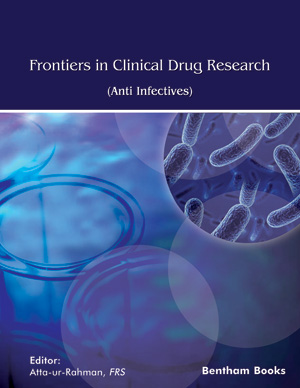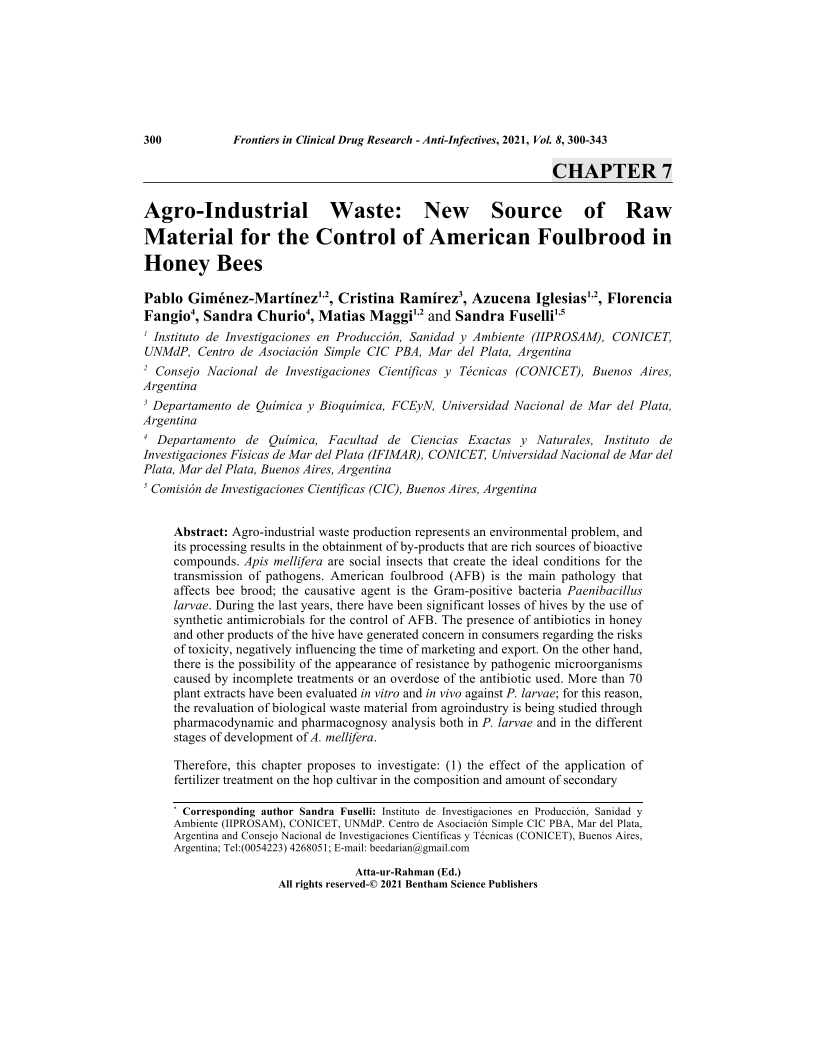Agro-Industrial Waste: New Source of Raw Material for the Control of American Foulbrood in Honey Bees

- Authors: Pablo Giménez Martínez1, Cristina Ramírez2, Florencia Fangio3, Azucena Iglesias4, Sandra Churio5, Matias Maggi6, Sandra Fuselli7
-
View Affiliations Hide Affiliations1 Instituto de Investigaciones en Produccin, Sanidad y Ambiente (IIPROSAM), CONICET, UNMdP, Centro de Asociacin Simple CIC PBA, Mar del Plata, Argentina 2 Consejo Nacional de Investigaciones Cientficas y Tcnicas (CONICET), Buenos Aires, Argentina 3 Departamento de Qumica, Facultad de Ciencias Exactas y Naturales, Instituto de Investigaciones Fsicas de Mar del Plata (IFIMAR), CONICET, Universidad Nacional de Mar del Plata, Mar del Plata, Buenos Aires, Argentina 4 Instituto de Investigaciones en Produccin, Sanidad y Ambiente (IIPROSAM), CONICET, UNMdP, Centro de Asociacin Simple CIC PBA, Mar del Plata, Argentina 5 Departamento de Qumica, Facultad de Ciencias Exactas y Naturales, Instituto de Investigaciones Fsicas de Mar del Plata (IFIMAR), CONICET, Universidad Nacional de Mar del Plata, Mar del Plata, Buenos Aires, Argentina 6 Instituto de Investigaciones en Produccin, Sanidad y Ambiente (IIPROSAM), CONICET, UNMdP, Centro de Asociacin Simple CIC PBA, Mar del Plata, Argentina 7 Instituto de Investigaciones en Produccin, Sanidad y Ambiente (IIPROSAM), CONICET, UNMdP, Centro de Asociacin Simple CIC PBA, Mar del Plata, Argentina
- Source: Frontiers in Clinical Drug Research - Anti Infectives: Volume 8 , pp 300-343
- Publication Date: November 2021
- Language: English
Agro-Industrial Waste: New Source of Raw Material for the Control of American Foulbrood in Honey Bees, Page 1 of 1
< Previous page | Next page > /docserver/preview/fulltext/9789815039412/chapter-7-1.gif
Agro-industrial waste production represents an environmental problem, and its processing results in the obtainment of by-products that are rich sources of bioactive compounds. Apis mellifera are social insects that create the ideal conditions for the transmission of pathogens. American foulbrood (AFB) is the main pathology that affects bee brood; the causative agent is the Gram-positive bacteria Paenibacillus larvae. During the last years, there have been significant losses of hives by the use of synthetic antimicrobials for the control of AFB. The presence of antibiotics in honey and other products of the hive have generated concern in consumers regarding the risks of toxicity, negatively influencing the time of marketing and export. On the other hand, there is the possibility of the appearance of resistance by pathogenic microorganisms caused by incomplete treatments or an overdose of the antibiotic used. More than 70 plant extracts have been evaluated in vitro and in vivo against P. larvae; for this reason, the revaluation of biological waste material from agroindustry is being studied through pharmacodynamic and pharmacognosy analysis both in P. larvae and in the different stages of development of A. mellifera.
Therefore, this chapter proposes to investigate: (1) the effect of the application of fertilizer treatment on the hop cultivar in the composition and amount of secondary metabolites, (2) the bioactivity of extracts of hop leaves against P. larvae, and in vitro toxicity in larvae and adult bees, and the effect on genes of the immune system of bees.
-
From This Site
/content/books/9789815039412.chapter-7dcterms_subject,pub_keyword-contentType:Journal -contentType:Figure -contentType:Table -contentType:SupplementaryData105

